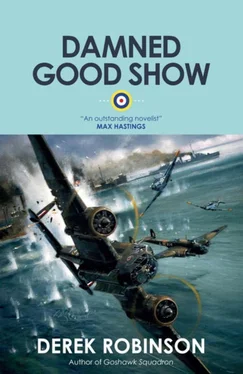A rumble of disbelief turned into loud laughter. This was anticlimax in spades. “Bags me two weeks’ leave!” someone called.
“That’s not all,” Hunt said, and they were silent again. “Poland’s out of range, of course, but the enemy has a coastline. He has warships which threaten our shipping. They might even bombard our towns.”
“Tried it last time,” Rafferty said. “Shelled Scarborough, Bridlington, Whitby Abbey. Sorry, wing commander.”
“We can bomb German warships at sea or at anchor without upsetting Mr. Roosevelt,” Hunt said, “because a ship at anchor is not part of the mainland.”
“Bloody clever,” someone muttered.
“The Intelligence Officer will give you the details.”
This was a heavy-set flight lieutenant, very bald, with a mustache thick enough to hide his expression. Above the medal ribbons, his half-wing of an observer had weathered to pearl gray. He was the only man in the squadron to wear spectacles. Everyone called him Bins, short for binoculars.
He unrolled a map of northern Europe. “To refresh your memory: Germany has two stretches of coastline,” he said. “One on each side of Denmark. Obviously, the more important, for us, is the North Sea coastline. It’s nearer, and it has important naval bases at Wilhelmshaven and Emden, plus the inland ports of Bremen and Hamburg. Beyond Denmark, on the Baltic, the German navy also uses Brunsbüttel, here at the mouth of the Kiel Canal. All those warships are available for attack under the Roosevelt Rules. Provided…”
He hooked another roll of paper over the map and let it fall open.
“This is Wilhelmshaven. You see the town here , and the docks here. The area in blue is the bay. Now, if a German cruiser, for instance, is tied up to the dockside, you must not bomb it.” He surveyed them over his horn-rims. They looked unhappy. Good. That meant they were listening. “Civilians live nearby. Some may be dockers. Your bombs might harm them.”
“Hard cheese,” someone growled.
“Any German vessel, warship or otherwise, attached to the dockside is part of the mainland and therefore immune. But…” Bins indulged himself in a short pause, “…if the ship is out here , offshore, maybe anchored, maybe not, it’s considered to be at sea. You can sink it with a clear conscience.”
“Are the Huns playing by the same rules?” a pilot asked.
“The German government has not yet responded.”
“Too busy bombing Poland.”
“Possibly. A few words about Denmark, Holland and Belgium. They are neutral and anxious to remain so. Fly over them and you may get shot at by their anti-aircraft guns, perhaps even attacked by their fighters…”
Bins answered a few questions and removed his maps. Rafferty stepped forward. The briefing had disappointed him: too flat, not enough gusto. “One last thing,” he said briskly. “Don’t believe anything an air marshal tells you.” That made them stare. “When he’s called Hermann Goering.” They laughed, which was what he wanted. “Half of it’s lies and the other half’s tosh. That’s not our style. The Royal Air Force might not get everything absolutely right but at least we don’t appoint an air marshal who’s too fat to get in a cockpit.” They laughed more freely. “And remember this. You’re lucky, damned lucky. This war isn’t going to be all mud and blood, like last time. This will be the war of the knockout blow, and you’re the boys with the big punch. Good luck!”
Walking back to the Mess for lunch, Rafferty said: “The chaps are in fine fettle, aren’t they? Itching for a scrap.”
“It’s quite crazy, sir,” Hunt said.
“Of course it is, old boy. Totally lunatic.”
“We’re not trained to bomb ships. Nobody in the Command is.”
“Of course not. You counted on mainland targets. We all did. You’re damn good at hitting them, given a spot of decent weather.”
“Warships dodge about so much.”
“Yes. They carry a lot of guns, too.”
“That’s another thing, sir. What’s the best way to hit a ship? Should we go in low?”
“If it was me, I’d be up at eight or ten thousand feet, where the guns can’t reach. Not the light guns, anyway.”
“From ten thousand, the target’s as thin as a pin and the bombs drift with the wind.”
“Well, in that case the whole thing’s absurd.”
“Crazy.” Hunt kicked the head off a dandelion. “But I suppose we’ll go ahead and do it anyway.”
“Certainly. Lunatic orders are in the finest tradition of the Service. Don’t think too much. Just do it.”
3
At about that time, an RAF Blenheim took off and headed across the North Sea. The weather was calm. A couple of hours later, the pilot was pleased to discover that he was bang on course, high above the approaches to Wilhelmshaven. That was good flying, plus a slice of luck.
Soon the crew looked down on a perfect view of fourteen German warships in formation: three battleships, four cruisers and seven destroyers. That was a really thick slice of luck. Immediately the Blenheim’s wireless operator reported the sighting. His radio wasn’t powerful enough to send a signal nearly four hundred miles. Bomber Command HQ received tattered fragments of the message and made no sense of them. Nobody’s luck lasts forever.
The Blenheim turned for home and flew into a storm. For the rest of the afternoon the pilot struggled against a thumping headwind. He landed shortly before five p.m. and made his report.
When the order to attack reached 409 Squadron, every crew wanted to go. All week they had been at various stages of alert; all day they had been on standby, sitting in their crew rooms, playing cards, reading stale news in newspapers, dozing, waiting, thinking. The sudden promise of action blew away boredom, but not for everyone. “Five aircraft,” Hunt announced. “That’s all they want. Five. I’m leading.” He quickly picked four experienced crews. They took off at six-fifteen.
Already the light was poor. To the east it was worse: black with thunderstorms. They crossed the coast at Lowestoft. It was their last sight of land for almost six hours. Before long the wind was gusting so badly that Hunt opened out the formation, to avoid collision. They flew with their navigation lights on. Hunt knew that his five were only part of a large force of bombers—eighteen Hampdens and nine Wellingtons—all aiming for the same spot on the map. The longer they flew, the greater the risk that two machines might try to occupy exactly the same spot at the same time. Each with a full load of bombs. He put it out of his mind.
Once, in the fading light, he thought he saw aircraft far to the north. Then cloud blotted out the dots.
The rest of the trip was a matter of increasing misery and fatigue. The Hampdens bucketed through a succession of storms. The rain made a racing skin on the windscreens and the pilots flew by instrument. Always the wind was violent, and without doubt it was changing direction. The observers were navigating by dead reckoning: we are flying on this compass bearing at that speed so, allowing for such and such a wind, we must be here. The storms made fools of the compass and blew the predicted winds to buggery. The Hampdens slogged on. With luck they ought to strike Germany somewhere in the hundred-mile gap between Denmark and Holland.
Perhaps they did. The light was so poor and the weather was so thick that none of the bombers made a landfall. Nobody found Germany, let alone Wilhelmshaven, let alone a pin-thin, blacked-out warship.
Hunt gave up the search after three hours. His arms and legs ached from the endless struggle to keep the Hampden on track. He had long since lost contact with the others. He got a course for home from his observer and steeled himself for another three hours of this wretched, bruising flight.
Читать дальше












